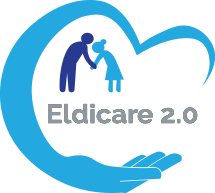Eldicare 2.0, a four-year Erasmus+ funded project (2023-2027), is an initiative that contributes to making elderly care in the EU more accessible for all, as well as improving its quality. At the heart of the initiative is a mission to modernise and professionalise long-term care by integrating digital and green solutions, supporting upskilling and reskilling of carers, and reinforcing cross-sectoral cooperation among training providers, social care institutions, and policy stakeholders.
The project aims to respond to urgent societal transformations affecting elderly care. It does so by strengthening the sector to meet increasing demand, ensuring that carers are equipped with the right mix of technical, soft, and entrepreneurial skills. Eldicare 2.0 also plays a key role in defining and promoting high-quality standards for care provision, aligning with the European Union’s long-term objectives on skills development and inclusive care.
Eldicare 2.0 builds upon the achievements of its predecessor, the Eldicare project (2018–2021), which helped shape workforce strategies in Europe’s growing “silver economy”. While the earlier project laid a strong foundation, its progress was impacted by the COVID-19 pandemic, which further exposed the vulnerabilities in elderly care systems. Eldicare 2.0 was conceived in response to these new realities, reinforcing the sector with targeted action that supports resilience, digitalisation, sustainability, and professionalisation.
With a partnership of 17 organisations across nine countries – Greece, Austria, France, Belgium, Bulgaria, Czech Republic, Germany, Luxembourg, and Spain –, Eldicare 2.0 reflects a pan-European commitment to workforce transformation in long-term care.
As the first milestone of the project, the Eldicare 2.0 partnership has drafted the EU Blueprint report led by Gérontopôle AURA in cooperation with all partner countries, and the umbrella organisations.
The Blueprint Report provides an in-depth look at the elderly care sector, highlighting both its challenges and opportunities. It is organised around four core themes: the post-COVID-19 landscape, skills and training gaps, best practices, and strategic recommendations for the sector’s future.
Based on interviews and surveys, the report reflects the real experiences of carers and offers an authentic picture of today’s care landscape. It reveals significant skills gaps not only between EU countries, but also between different professions within the same country.
For example, interviews revealed mixed views on entrepreneurial skills. Field workers often consider them essential for managerial roles, highlighting financial awareness, communication, motivation, and creative problem-solving. Managers, on the other hand, see these skills as key to overall organisational effectiveness, especially during staff shortages. Survey data supports these insights. With managers making up the largest share of respondents, participants rated their proficiency in entrepreneurial skills at 3.1 out of 5. They reported greater familiarity with entrepreneurial than green skills (3.2 vs. 2.6), and rated entrepreneurial skills as important (4.1), relevant (3.9), and applicable (3.8).
When it comes to green skills, the familiarity of the participants with these skills were 2.6/5. They were more known in Austria, the Czech Republic and France, compared to Bulgaria, Greece and Spain. According to the interviews some current applications of this skill are changes in kitchen practices such as buying locally and producing less waste, having waste management strategies such as recycling on a structure base, having less work trips, and so on.
Survey results show that carers rated their digital proficiency at 3.1 out of 5. Interviews revealed that digitalisation has improved communication, streamlined administrative work, and enhanced care quality. However, it also poses challenges: constant connectivity demands, financial and time constraints, and concerns about the “dehumanisation” of care. Rapid digitalisation has also created new roles, including telemedicine and remote services in countries such as Bulgaria, the Czech Republic, France, and Greece. This highlights the urgent need to bridge digital skills gaps and address the ethical implications of technology in care.
Soft skills stand out as the strongest area, with participants rating their proficiency at 3.4 out of 5 — the highest among the four skills analysed. During the pandemic, qualities such as patience, adaptability, and resilience proved essential. Still, carers and managers alike need greater autonomy, stronger diversity and intercultural training, and more emphasis on self-care practices.
The research highlights a strong appetite for further training, with carers rating their interest at 4.5 out of 5. Many believe upskilling would enhance both their professional growth and the quality of care for older adults. Yet, survey data shows a shortage of effective online programmes: 418 respondents reported a lack of such opportunities, while only 89 confirmed their availability. Spain reported the highest share of positive responses (19%), compared to just 5% in Bulgaria.
Based on these insights, the report presents clear recommendations for VET providers, health authorities, governments, older adult care facilities, and carers. It calls for training programmes that are practical and tailored to carers’ real needs, such as hybrid courses delivered during working hours, with longer programmes spread over several months in short, regular sessions (30 minutes to 2 hours). The report also highlights the importance of strategies to boost engagement and motivation and recommends recognising participation through certificates.
To validate the findings, the umbrella organisations organised a European online workshop in September 2024, under the coordination of ESN. The results were presented by Gérontopôle AURA to a group of experts from both consortium and non-consortium countries, including Belgium, Portugal, Malta, and the USA, who brought extensive experience in elderly care and European initiatives. Their feedback contributed to the finalisation of the report, ensuring its relevance and applicability across different contexts.
After its official validation and publication on the Eldicare 2.0 project website, the report will also be shared with key stakeholders, such as Pact4Skills Initiative, ESCO, and Skills Panorama to ensure broader dissemination and uptake of the results. Next steps for the project include the development of a skills observatory, the delivery of updated training curricula, the launch of an online training platform, and the formulation of policy recommendations to further support the transformation of elderly care across Europe.
Media contact:
European Vocational Training Association
Tel: +32 0 27722858
E-mail: info@evta.eu

